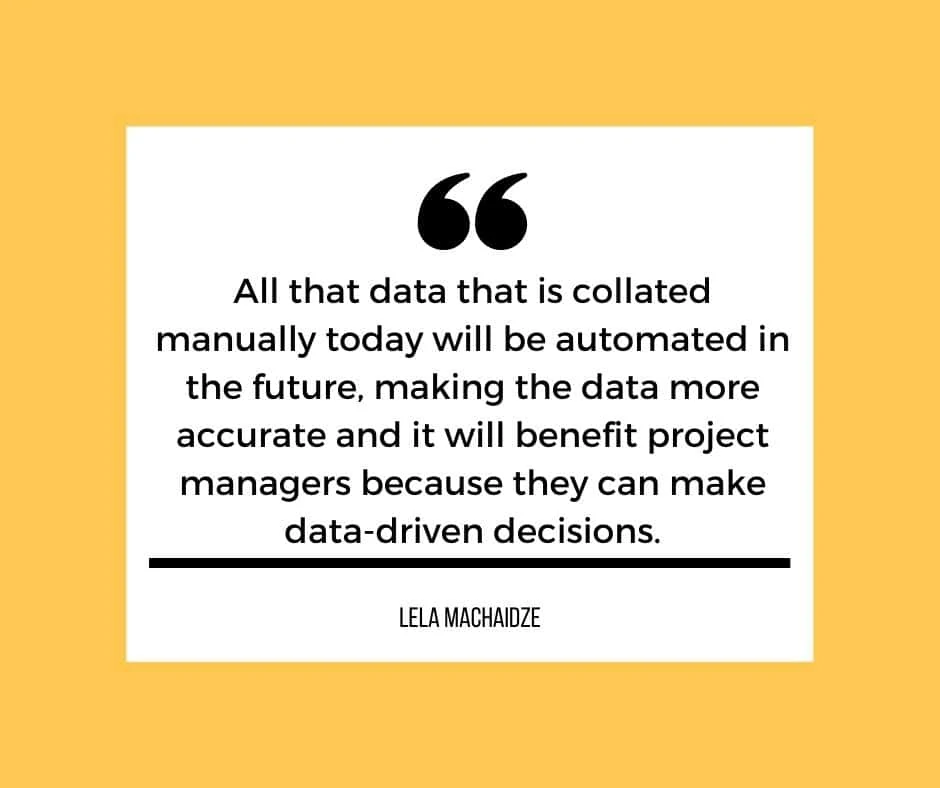Future Trends in Project Management: The Debate
Recently I spoke with Lela Machaidze on Clubhouse about future trends in project management. Here are the notes from that discussion.
Lela: For the last decade, there have been a lot of changes in the PM profession. The trend that is here to stay is remote work and digital teams. That’s echoed in the PMI Pulse of the Profession 2021 report. Maybe not in the same volume as we are seeing now, but it will definitely stay.
Another trend is AI and simple admin tasks will be accomplished by bots. That’s something we’re seeing more and more, and the statistics show AI is key for project management.
Different organizations are already offering this service. It will be something we see more of and it will lead into other trends – for example, driving data analysis and giving recommendations for decisions. PMs will have to acquire more soft skills.
The next topic that comes to mind for the future of project management is data science and analytics. All that data that is collated manually today will be automated in the future, making the data more accurate and it will benefit project managers because they can make data-driven decisions.

Besides AI and automation, there will be different PM tools used for project management. There are more than 60 tools that support project managers in managing their tasks. The technology is moving very fast. A skill for PMs will be design thinking and analytical thinking to select the right tools and instruments, applications for the organisation, specific to the organisation.
Community shares
Robert @valle00r: All these things are happening now. In order to stay relevant, project managers may need to learn new skills and go from Excel to learning other tools like Tableau, SQL and Python. What is the new role of project management in relation to advances in data science?
Elizabeth: PWC did some research into how AI will change the role of PM. They talk about the impacts as: providing business insights, risk management, human capital optimisation, action taking and active assistance.
Lela: Projects are done by people, not by machines and apps – at least for now! There will still be the need for innovation. This is one of the critical skills of what project managers will need in the future. Also, millennial PMs are more driven by equality, so working with millennial teams will require a different type of soft skills, like building EQ and leadership. You still need to work with data analysts from the millennial generation, and the PM is the guru connecting the team, especially now teams are remote. The domain is changing, speed is changing. PMs need to understand that we need to change with the time.
Amr Alaa @amralaa99: We are using artificial intelligence, but at the end it depends on human interaction. Satellite reports show progress on the site but at the end I have to have a meeting to discuss this and we still have people who don’t know how to use a computer yet so there are obstacles to overcome and training to do. The PM can not only depend on the systems, the PM has to communicate with all the resources and control the progress.
Hooshiar Ahmadpnah @hooshiara: Will people need BIM (Building Information Modelling) project management roles in the future? BIM managers are in between modellers and project managers.
Elizabeth: Yes. It’s a key skill.
Lela: BIM managers and engineers are in demand in Georgia. The resource is really valued. There is room for this speciality; it’s a tool for creating detailed design.
Lanfranco Fiorentino @lanfrancof: As we progress into the future we’re going to have a gap between the project manager we used to know, the one who got their hands dirty managing the project, connecting with people on site or on the phone, who didn’t have software to track the project so they built their own tools and eventually learned to use project software as an aid to everyday activity. This project manager invests in communication as the most important tool to be used. On the other side, I’m seeing ‘PM by the badge’, people who take a course and now calls themselves a project manager, which is a path we want to avoid. The software now plays the role of the project manager and will be helping out in tracking the project which makes the person really a software operator instead of a project manager. Their role will be more tailored to communicating what the software says.
Elizabeth: There is a role for someone who can operate the software, perhaps that’s a role that would sit within the PMO. I don’t think the role of the PM will be devalued by more advanced software; in fact, I think it will be the opposite. Organisations that appreciate the value of project management will see that the role is really to guide the process and bring people together. Software can’t motivate you to follow a leader or bring someone along on a change curve.
Lela: PMI is trying to minimise the gap between ‘PM by the badge’ and project managers because there is more emphasis put on practical skills and practitioners contributing to creating workshops. Adaptability is another key skill. AQ (Adaptability Quotient) is being tested in Silicon Valley – how adaptable they can be in a situation.
Mary Nayebi @marynayebi: I was getting ready for my
Lela: The amount of time it will take is personal and depends on how much time you’ve got to study and what your background is. Spend 1-2 hours a day, you can study for
Mary: Do you think having a
Lela: There are pre-requisites for applying for the
Follow us on Clubhouse: @elizabethharrin and @lelamachaidze
Follow us on Instagram: @elizabeth.harrin and @lelamachaidze
Pin for later reading

